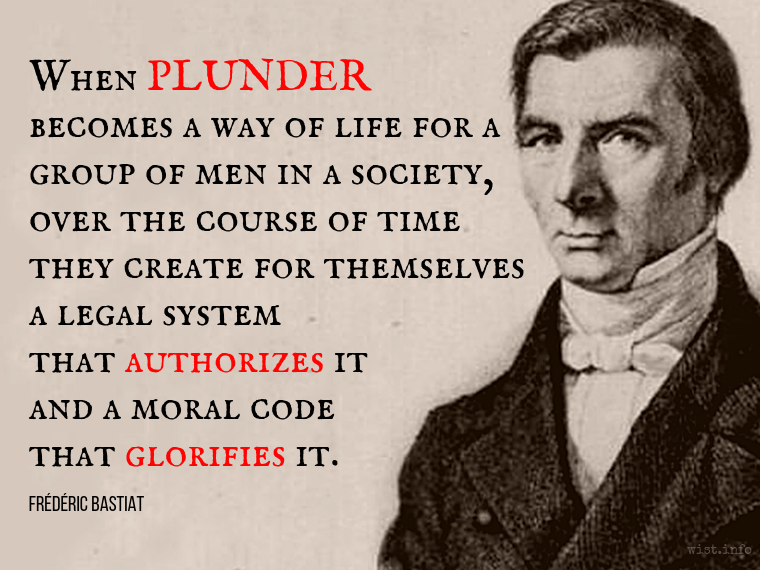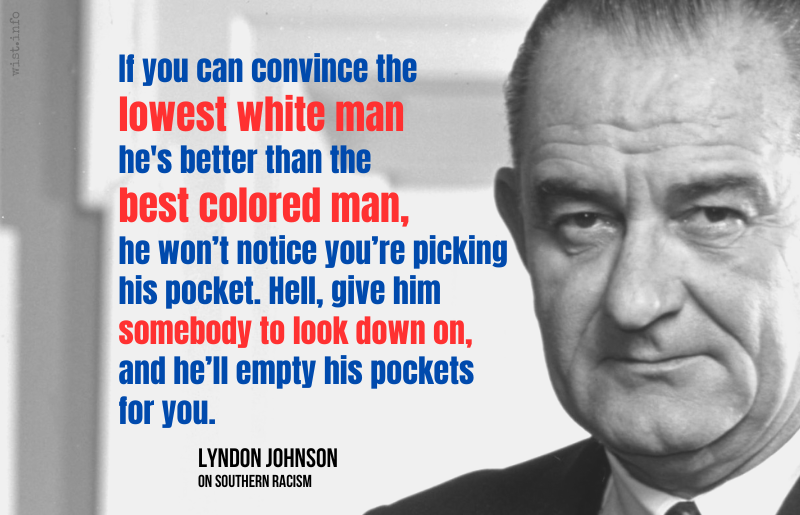CALVIN’S MOM: There would be more civility in this world if people didn’t take it as an invitation to walk on you.
Quotations about:
exploitation
Note not all quotations have been tagged, so Search may find additional quotes on this topic.
I see a lot in the Papers about this 20th or Child Labor Amendment, and I have been asked how I stand on that. If Congress or the States would just pass one law, as follows, they wouldn’t need any Amendment: “EVERY CHILD, REGARDLESS OF AGE, SHALL RECEIVE THE SAME WAGE AS A GROWN PERSON.” That will stop your child labor.
Will Rogers (1879-1935) American humorist
Column (1924-12-28), “Weekly Article: Aviation is 20 Years Old but Congress Never Heard of It” [No. 107]
(Source)
It is the eternal struggle between these two principles — right and wrong — throughout the world. They are the two principles that have stood face to face from the beginning of time, and will ever continue to struggle. The one is the common right of humanity, and the other the divine right of kings. It is the same principle in whatever shape it develops itself. It is the same spirit that says, “You work and toil and earn bread, and I’ll eat it.” No matter in what shape it comes, whether from the mouth of a king who seeks to bestride the people of his own nation and live by the fruit of their labor, or from one race of men as an apology for enslaving another race, it is the same tyrannical principle.
Abraham Lincoln (1809-1865) American lawyer, politician, US President (1861-65)
Speech (1858-10-15), Lincoln-Douglas Debate No. 7, Alton, Illinois
(Source)
So we started in to pay some attention to our neighbors to the south. Up to now our calling card to Mexico or Central America had been a gunboat or a bunch of Violets shaped like Marines. We could never understand why Mexico wasent just crazy about us; for we always had their good-will, and Oil and coffee and minerals, at heart.
Will Rogers (1879-1935) American humorist
Essay (1928-05-12), “More Letters from a Self-Made Diplomat to His President,” Saturday Evening Post, Vol. 200, No. 46
(Source)
Excerpted in Donald Day (ed.), The Autobiography of Will Rogers, ch. 14 (1949), which indicates Rogers' trip to Mexico was in December 1927. The text there is the same except at the very beginning, where it reads "We've started in to pay ..."
Shortened variant:I see where we are starting to pay some attention to our neighbors to the south. We could never understand why Mexico wasn't just crazy about us, for we have always had their good will, and oil and minerals, at heart.
The man who, if born to wealth and power, exploits and ruins his less fortunate brethren is at heart the same as the greedy and violent demagogue who excites those who have not property to plunder those who have.
Theodore Roosevelt (1858-1919) American politician, statesman, conservationist, writer, US President (1901-1909)
Speech (1910-04-23), “Citizenship in a Republic [The Man in the Arena],” Sorbonne, Paris
(Source)
The individualism which finds its expression in the abuse of physical force is checked very early in the growth of civilization, and we of to-day should in our turn strive to shackle or destroy that individualism which triumphs by greed and cunning, which exploits the weak by craft instead of ruling them by brutality.
Theodore Roosevelt (1858-1919) American politician, statesman, conservationist, writer, US President (1901-1909)
Speech (1910-04-23), “Citizenship in a Republic [The Man in the Arena],” Sorbonne, Paris
(Source)
The Rich knowes not who is his friend.
George Herbert (1593-1633) Welsh priest, orator, poet.
Jacula Prudentum, or Outlandish Proverbs, Sentences, &c. (compiler), # 865 (1640 ed.)
(Source)
Democracy is the theory that two thieves will steal less than one, and three less than two, and four less than three, and so on ad infinitum.
H. L. Mencken (1880-1956) American writer and journalist [Henry Lewis Mencken]
A Little Book in C Major, ch. 5, § 25 (1916)
(Source)
Variant:DEMOCRACY. The theory that two thieves will steal less than one, and three less than two, and four less than three, and so on ad infinitum.
A Book of Burlesques, "The Jazz Webster" (1924)
Again we have deluded ourselves into believing the myth that Capitalism grew and prospered out of the Protestant ethic of hard work and sacrifice. The fact is that Capitalism was built on the exploitation and suffering of black slaves, and continues to thrive on the exploitation of the poor, both black and white, both here and abroad.
Martin Luther King, Jr. (1929-1968) American clergyman, civil rights leader, social activist, preacher
“The Three Evils,” Keynote Speech, National Conference for New Politics, Chicago (31 Aug 1967)
(Source)
We first debase the nature of man by making him a slave, and then very coolly tell him that he must always remain a slave because he does not know how to use freedom. We first crush people to the earth, and then claim the right of trampling on them forever, because they are prostrate. Truly, human selfishness never invented a rule, which worked so charmingly both ways!
Lydia Maria Child (1802-1880) American abolitionist, activist, journalist, suffragist
An Appeal on Behalf of That Class of Americans Called Africans, ch. 6 (1833)
(Source)
Altruism is a hard master; but so is opportunism.
Mignon McLaughlin (1913-1983) American journalist and author
The Neurotic’s Notebook, ch. 5 (1963)
(Source)
In any country, regardless of what its laws say, wherever people act upon the idea that the disadvantage of one man is the good of another, there slavery exists. Wherever, in any country the whole people feel that the happiness of all is dependent upon the happiness of the weakest, there freedom exists.
Booker T. Washington (1856-1915) American educator, writer
Speech, Republican Club, New York City (12 Feb 1909)
(Source)
The nature of liberal democracy prevents propagandistic statements from being banned, since among the liberties it permits is the freedom of speech. But since humans have characteristic rational weaknesses and are susceptible to flattery and manipulation, allowing propaganda has a high likelihood of leading to tyranny, and hence to the end of liberal democracy.
Jason Stanley (b. 1969) American philosopher, epistemologist, academic
How Propaganda Works, ch. 1 (2015)
(Source)
What is blasphemy? I will give you a definition; I will give you my thought upon this subject. What is real blasphemy?
To live on the unpaid labor of other men — that is blasphemy.
To enslave your fellow-man, to put chains upon his body — that is blasphemy.
To enslave the minds of men, to put manacles upon the brain, padlocks upon the lips — that is blasphemy.
To deny what you believe to be true, to admit to be true what you believe to be a lie — that is blasphemy.
To strike the weak and unprotected, in order that you may gain the applause of the ignorant and superstitious mob — that is blasphemy.
To persecute the intelligent few, at the command of the ignorant many — that is blasphemy.
To forge chains, to build dungeons, for your honest fellow-men — that is blasphemy.
To pollute the souls of children with the dogma of eternal pain — that is blasphemy.
To violate your conscience — that is blasphemy.
The jury that gives an unjust verdict, and the judge who pronounces an unjust sentence, are blasphemers.
The man who bows to public opinion against his better judgment and against his honest conviction, is a blasphemer.
Robert Green Ingersoll (1833-1899) American lawyer, freethinker, orator
Speech to the Jury, Trial of C. B. Reynolds for Blasphemy, Morristown, New Jersey (May 1887)
(Source)
When democracy granted democratic methods for us in the times of opposition, this was bound to happen in a democratic system. However, we National Socialists never asserted that we represented a democratic point of view, but we have declared openly that we used democratic methods only in order to gain the power and that, after assuming the power, we would deny to our adversaries without any consideration the means which were granted to us in the times of opposition.
Joseph Goebbels (1897-1945) German Nazi politician, propagandist, bureaucrat
Nature and Form of National Socialism [Wesen und Gestalt des Nationalsozialismus], Pamphlet (1935)
(Source)
Quoted in Office of the United States, Chief Counsel for Prosecution of Axis Criminality, Nazi Conspiracy and Aggression, Vol. 1, ch. 7, doc. 2412-PS (1946)
The mistake is to assume that rulers who came to power through institutions cannot change or destroy those very institutions — even when that is exactly what they have announced that they will do.
Timothy Snyder (b. 1969) American historian, author
On Tyranny: Twenty Lessons from the Twentieth Century (2017)
(Source)
I would rather be defeated than make capital out of my religion.
James A. Garfield (1831-1881) US President (1881), lawyer, lay preacher, educator
Speech, Chatauqua (1 Apr 1880)
(Source)
In truth, prosperity tries the souls of even the wise; how then should men of depraved character like these make a moderate use of victory?
[Quippe secundae res sapientium animos fatigant, ne illi corruptis moribus victoriae temperarent.]
Sallust (c. 86-35 BC) Roman historian and politician [Gaius Sallustius Crispus]
Bellum Catilinae [The War of Cateline; The Conspiracy of Catiline], ch. 11, sent. 8 [tr. Rolfe (1931)]
(Source)
Alt. trans.:
- "A series of prosperity is often too much even for the wisest and best disposed: that men corrupted should make a temperate use of their victory could not be expected." [tr. Murphy (1807)]
- "For success unhinges the minds even of wise men; how then should they who were so depraved use their victory with moderation?" [tr. Rose (1831)]
- "For success tries the minds of wise men, much less could they, when their morals were corrupted, use their victory with moderation." [Source (1841)]
- "Success unsettles the principles even of the wise, and scarcely would those of debauched habits use victory with moderation." [tr. Watson (1867)]
- "Since even the wise have their temper tried by prosperity, much less could men of this abandoned character use their success with moderation." [tr. Pollard (1882)]
- "Successful situations overwhelm the minds even of the wise; still less wouild those men of corrupt morals moderate their victory." [tr. Woodman (2007)]
One is reminded of the dialectical definition, by the wry Polish intellectual, of capitalism and communism. Capitalism, it is said, is a system wherein man exploits man. And communism — is vice versa.
Daniel Bell (1919-2011) American sociologist, writer, editor, academic
The End of Ideology, Introduction (1961 ed.)
(Source)
Usually quoted with just the last two sentences, and misattributed directly to Bell.
When plunder has become a way of life for a group of men living together in society, they create for themselves in the course of time a legal system that authorizes it and a moral code that glorifies it.
[Lorsque la Spoliation est devenue le moyen d’existence d’une agglomération d’hommes unis entre eux par le lien social, ils se font bientôt une loi qui la sanctionne, une morale qui la glorifie.]
Frédéric Bastiat (1801-1850) French philosopher, economist, politician
Economic Sophisms [Sophismes Économiques], 2nd Series, ch. 1 “Physiology of Plunder [Physiologie de la Spoliation]” (1848) [tr. Goddard (1964)]
(Source)
(Source (French)). Other translations:When Spoliation has once become the recognised means of existence of a body of men united and held together by social ties, they soon proceed to frame a law which sanctions it, and to adopt a system of morals which sanctifies it.
[tr. Stirling (1873)]When Plunder becomes a way of life for a group of men in a society, over the course of time they create for themselves a legal system that authorizes it and a moral code that glorifies it.
[tr. Goddard (variant/paraphrase)]
Good general-purpose manners nowadays may be said to consist in knowing how much you can get away with.
The superstitious man is to the knave, what the slave is to the tyrant; nay more — the superstitious man is governed by the fanatic, and becomes a fanatic himself.
Voltaire (1694-1778) French writer [pseud. of Francois-Marie Arouet]
“Superstition,” Philosophical Dictionary (1764) [tr. Fleming (1901)]
(Source)
Alt. trans.: "The superstitious man is to the rascal what the slave is to the tyrant." [tr. Besterman (1971)]
The fact that the stupid person is often stubborn must not blind us to the fact that he is not independent. In conversation with him, one virtually feels that one is dealing not at all with him as a person, but with slogans, catchwords, and the like that have taken possession of him. He is under a spell, blinded, misused, and abused in his very being. Having thus become a mindless tool, the stupid person will also be capable of any evil and at the same time incapable of seeing that it is evil. This is where the danger of diabolical misuse lurks, for it is this that can once and for all destroy human beings.
Dietrich Bonhoeffer (1906-1945) German Lutheran pastor, theologian, martyr
“On Stupidity” (1942)
(Source)
[The] “robbing of the poor because he is poor,” is especially the mercantile form of theft, consisting in taking advantage of a man’s necessities in order to obtain his labor or property at a reduced price. The ordinary highwayman’s opposite form of robbery — of the rich, because he is rich — does not appear to occur so often to the old merchant’s mind; probably because, being less profitable and more dangerous than the robbery of the poor, it is rarely practice by persons of discretion.
POLLY PEACHUM: The law is simply and solely made for the exploitation of those who do not understand it or of those who, for naked need, cannot obey it.
There are but two ways of rising in the world: either by your own industry or by the folly of others.
[Il n’y a au monde que deux manières de s’élever, ou par sa propre industrie, ou par l’imbécillité des autres.]
Jean de La Bruyère (1645-1696) French essayist, moralist
The Characters [Les Caractères], ch. 6 “Of Gifts of Fortune [Des Biens de Fortune],” § 52 (6.52) (1688) [tr. Van Laun (1885)]
(Source)
(Source (French)). Alternate translations:There is but two ways of rising in the World, by your own Industry, and another's Weakness.
[Bullord ed. (1696)]There are only two ways of rising in the World, by your own Industry, or by the Weakness of others.
[Curll ed. (1713)]There are but two ways of rising in the World, by your own Industry, or the Weakness of others.
[Browne ed. (1752)]There are only two ways of getting on in the world: either by one's own cunning efforts, or by other people's foolishness.
[tr. Stewart (1970)]
The Rich knowes not who is his friend.
George Herbert (1593-1633) Welsh priest, orator, poet.
Jacula Prudentum, or Outlandish Proverbs, Sentences, &c. (compiler), # 865 (1640 ed.)
(Source)
If you can convince the lowest white man he’s better than the best colored man, he won’t notice you’re picking his pocket. Hell, give him somebody to look down on, and he’ll empty his pockets for you.
Lyndon B. Johnson (1908-1973) American politician, educator, US President (1963-69)
Comment (1960)
(Source)
Discussing racist graffiti in Tennessee, seen earlier in the day. Recalled in Bill Moyers, "What a Real President Was Like," Washington Post (1988-11-13).
More discussion here: Did Lyndon B. Johnson Say This About The 'Lowest White Man' and 'Best Colored Man'? | Snopes.com.
One of the benefits that oppression confers upon the oppressors is that the most humble among them is made to feel superior; thus, a poor white in the South can console himself with the thought that he is not a “dirty nigger” — and the more prosperous whites cleverly exploit this pride. Similarly, the most mediocre of males feels himself a demigod as compared with women.
Simone de Beauvoir (1908-1986) French author, existentialist philosopher, feminist theorist
The Second Sex, Introduction (1950) [tr. Parshley (1952)]
See Johnson.
There are more Fools than Knaves in the World,
Else the Knaves would not have enough to live upon.Samuel Butler (1835-1902) English novelist, satirist, scholar
Prose Observations, “Sundry Thoughts”
(Source)
Up to now, America has not been a good milieu for the rise of a mass movement. What starts out here as a mass movement ends up as a racket, a cult, or a corporation. Unlike those anywhere else, the masses in America have never despaired of the present and are not willing to sacrifice it for a new life and a new world.
Eric Hoffer (1902-1983) American writer, philosopher, longshoreman
“The Negro Revolution,” The Temper of Our Time (1967)
(Source)
Frequently misquoted as "Every great cause begins as a movement, becomes a business, and eventually degenerates into a racket."
Originally published in the New York Times Magazine (1964-11-29).
A man who does not possess himself enough to hear disagreeable things without visible marks of anger and change of countenance, or agreeable ones without sudden bursts of joy and expansion of countenance, is at the mercy of every artful knave or pert coxcomb.
To be thoroughly good-natured, and yet avoid being imposed upon, shows great strength ov character.
Josh Billings (1818-1885) American humorist, aphorist [pseud. of Henry Wheeler Shaw]
Everybody’s Friend, Or; Josh Billing’s Encyclopedia and Proverbial Philosophy of Wit and Humor, ch. 157 “Affurisms: Hot Korn” (1874)
(Source)
The best index to a person’s character is (a) how he treats people who can’t do him any good, and (b) how he treats people who can’t fight back.
Abigail Van Buren (1918-2013) American columnist [a.k.a. Dear Abby, pen name for Pauline Phillips]
“Dear Abby” column (16 May 1974)
The earliest variation on this thought appears to be from Paul Eldridge.
It is the common fate of the indolent to see their rights become a prey to the active. The condition upon which God hath given liberty to man is eternal vigilance; which condition if he break, servitude is at once the consequence of his crime and the punishment of his guilt.
John Philpot Curran (1750-1817) Irish lawyer and politician
Speech before Privy Council, Dublin (1790-07-10)
(Source)
On the right of election of the Lord Mayor of Dublin. Commonly paraphrases:More discussion (especially regarding attribution to Thomas Jefferson): Eternal vigilance is the price of liberty (Spurious Quotation) | Monticello.
- "Eternal vigilance is the price of liberty."
- "The price of liberty is eternal vigilance."







































